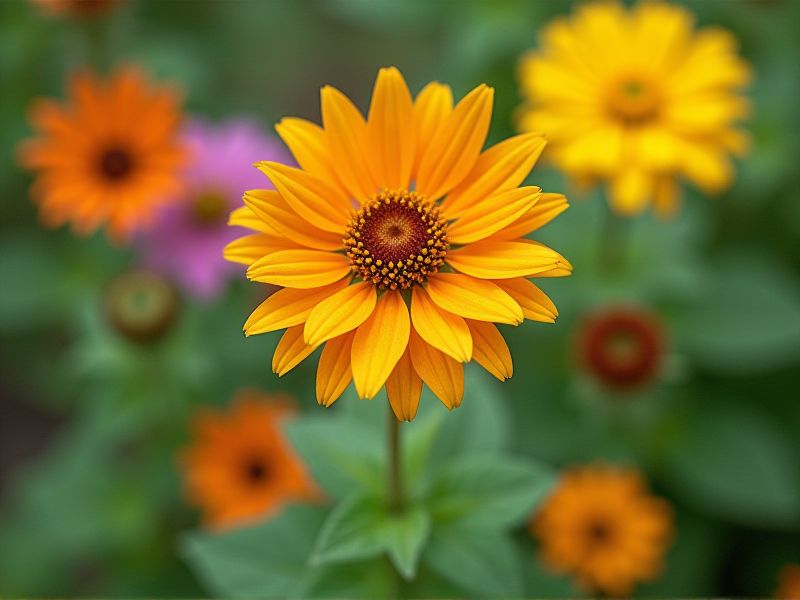
Ornamental plants that resist pests include varieties like marigolds, which produce natural compounds to deter insects, and lavender, known for its aromatic oils. Incorporating these resilient species into your garden not only enhances aesthetics but also minimizes the need for chemical pesticides. Other beneficial choices are petunias and geraniums, both of which attract pollinators while repelling harmful pests. By selecting these plants, you create a healthier ecosystem, promoting biodiversity in your garden. Exploring native species also offers a sustainable and pest-resistant approach, as they are well-adapted to local conditions and ecological relationships.
List of some Ornamental plants that resist pests
- Marigold (Tagetes spp.)
- Lavender (Lavandula spp.)
- Nasturtium (Tropaeolum majus)
- Petunia (Petunia spp.)
- Zinnia (Zinnia elegans)
- Geranium (Pelargonium spp.)
- Salvia (Salvia spp.)
- Coneflower (Echinacea purpurea)
- Chrysanthemum (Chrysanthemum spp.)
- Daffodil (Narcissus spp.)
Important things about Ornamental plants that resist pests
Natural Pest Deterrents
Many ornamental plants possess natural pest-resistant qualities, making them ideal for gardens seeking an eco-friendly approach. For instance, marigolds release allelochemicals that deter aphids and nematodes, while lavender's aromatic oils repel various harmful insects. Ornamental grasses like maiden grass not only add aesthetic appeal but also serve as barriers against pests. By incorporating these resilient species into your landscape, you can create a vibrant, low-maintenance garden that thrives without heavy reliance on chemical pesticides.
Adaptability To Local Climates
Ornamental plants that exhibit adaptability to local climates often demonstrate enhanced resistance to pests, making them valuable for sustainable landscaping. Species such as Lavandula angustifolia and Salvia officinalis thrive in arid conditions and repel common garden pests due to their aromatic oils. By selecting native plants, like Echinacea purpurea, you can not only support local ecosystems but also minimize the need for chemical pest control methods. Emphasizing the importance of drought-resistant and pest-resistant varieties fosters a healthier environment while maintaining the aesthetic appeal of your garden.
Low Maintenance Requirements
Ornamental plants such as lavender, marigolds, and Russian sage are excellent choices for gardening enthusiasts seeking low-maintenance options that naturally resist pests. These resilient species often contain aromatic oils that deter common insects, making them ideal for your garden without the need for chemical pesticides. Incorporating these plants not only reduces upkeep but also enhances the aesthetic appeal of your landscape with vibrant colors and fragrant blooms. By selecting pest-resistant ornamental plants, you can create a thriving garden ecosystem that requires minimal intervention while promoting biodiversity.
Biodiversity Benefits
Ornamental plants that resist pests play a crucial role in enhancing biodiversity in gardens and landscapes. By utilizing pest-resistant species, you can reduce the reliance on chemical pesticides, promoting a healthier ecosystem for beneficial insects and pollinators. These plants not only thrive in various environments but also attract wildlife, adding aesthetic value while contributing to ecological stability. Incorporating such resilient varieties supports the conservation of plant diversity, fosters sustainable gardening practices, and enhances the overall health of your garden.
Companion Planting Advantages
Companion planting with ornamental plants can enhance garden health by attracting beneficial insects and repelling pests naturally. For instance, marigolds are known to deter nematodes and certain beetles, making them ideal companions for vulnerable plants. Incorporating plants like nasturtiums can provide a protective barrier, as they attract aphids away from your more valuable crops. This strategic planting approach not only improves pest resistance but also enhances the aesthetic appeal of your garden.
Drought Resistance
Drought-resistant ornamental plants, such as succulents and xerophytes, are essential for sustainable landscaping, particularly in arid climates. These plants typically possess adaptations like thickened leaves and specialized root systems that minimize water loss and efficiently access moisture, enabling them to thrive in dry conditions. Moreover, species such as lavender and ornamental grasses not only exhibit drought resistance but also serve as natural pest deterrents, reducing reliance on chemical pesticides. By incorporating these resilient plants into your garden, you create a low-maintenance landscape that attracts beneficial insects while conserving water resources.
Soil Health Improvement
Enhancing soil health is crucial for cultivating ornamental plants resistant to pests. Healthy soil, enriched with organic matter and beneficial microorganisms, supports robust plant growth while naturally deterring pests. Selecting pest-resistant species, such as marigolds and geraniums, can further enhance your garden's resilience against infestations. Implementing practices like mulching and crop rotation not only nurtures the soil but also promotes a balanced ecosystem, allowing ornamental plants to thrive.
Attract Beneficial Insects
Ornamental plants, such as marigolds and nasturtiums, can serve as a natural pest deterrent while attracting beneficial insects like ladybugs and lacewings. These plants possess secondary metabolites that repel harmful pests but provide a nectar source for pollinators and pest predators. Your garden can flourish with vibrant blooms that not only enhance aesthetic appeal but also create a balanced ecosystem, reducing the need for chemical pesticides. Integrating native flowering plants into your landscape can further improve biodiversity, promoting healthier ornamental plant growth.
Traditionally Used In Pest Control
Ornamental plants such as marigolds, lavender, and rosemary are known for their natural pest-repelling properties, making them ideal choices for gardens requiring minimal maintenance. Marigolds contain compounds that deter nematodes and aphids, while the strong fragrance of lavender can repel moths, fleas, and mosquitoes. Rosemary not only enhances the flavor of your culinary dishes but also acts as a natural insect repellent, particularly against flies and cabbage moths. Incorporating these resilient plants in your landscape not only beautifies your space but also reduces reliance on chemical pesticides, promoting a healthier environment.
Variety Of Aesthetic Options
Ornamental plants resistant to pests offer both beauty and practicality for your garden, enhancing aesthetic appeal while requiring less maintenance. Varieties such as marigolds, petunias, and lavender not only introduce vibrant colors and delightful fragrances but also deter common garden pests, making them a smart choice for sustainable landscaping. Incorporating these resilient plants can create an eco-friendly environment, promoting biodiversity while minimizing the need for chemical pesticides. This strategic selection not only enriches your outdoor space but also contributes to a healthier ecosystem.
